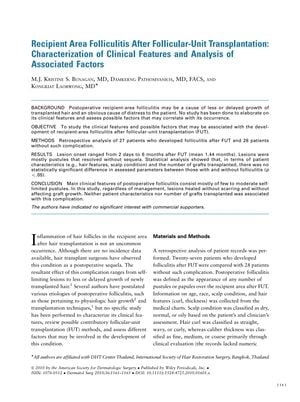Recipient Area Folliculitis After Follicular-Unit Transplantation: Characterization of Clinical Features and Analysis of Associated Factors
July 2010
in “
Dermatologic Surgery
”

TLDR Postoperative folliculitis after hair transplants is a minor issue that doesn't relate to patient details or how much hair is transplanted.
The study retrospectively analyzed 55 patients, 27 of whom developed folliculitis after undergoing follicular-unit transplantation (FUT), and compared them to 28 patients who did not develop this complication. Folliculitis appeared between 2 days to 6 months post-FUT, presenting as self-limited pustules that resolved without scarring and did not affect graft growth. Statistical analysis showed no significant difference in patient characteristics or the number of grafts transplanted between the two groups. The study concluded that postoperative folliculitis is typically a minor complication that does not correlate with patient demographics or the extent of the transplantation procedure.





